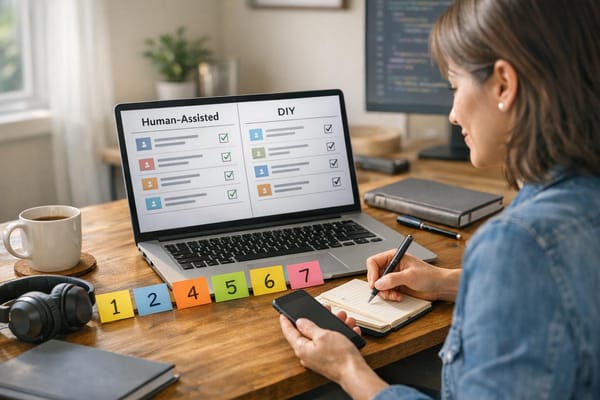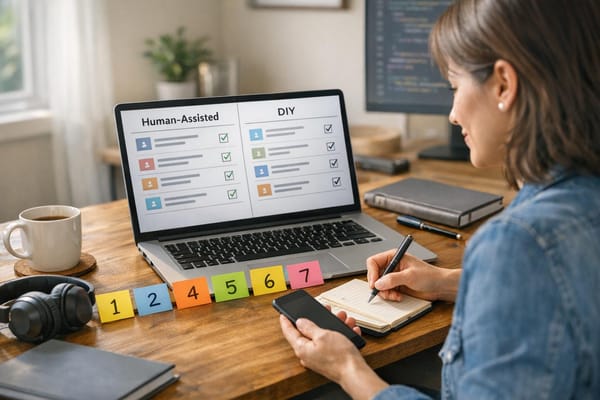Common Mistakes When Using Keywords in Cover Letters
Learn the common pitfalls of using keywords in cover letters and how to effectively incorporate them to enhance your job application.

Using keywords in cover letters is essential, but doing it wrong can hurt your chances. Here are the most common mistakes and how to fix them:
- Keyword Stuffing: Overloading keywords makes your letter unnatural and flags it in ATS.
- Missing Context: Keywords without examples make your skills seem unproven.
- Generic Terms: Broad phrases like "team player" fail to showcase expertise.
- Ignoring Soft Skills: Overemphasis on technical skills neglects interpersonal abilities.
- Wrong Keywords: Using irrelevant or outdated terms shows a lack of industry knowledge.
Quick Fixes:
- Use keywords naturally in sentences.
- Back them up with specific examples and measurable results.
- Balance technical and soft skills.
- Research job descriptions to find the right keywords.
Pro Tip: Focus on quality over quantity - one strong, well-supported keyword is better than five weak ones.
How to Choose Keywords for Your Resume to Make the ATS Happy
Mistake 1: Too Many Keywords
Overloading your cover letter with keywords can make it harder to read and hurt your chances with both applicant tracking systems (ATS) and recruiters.
Signs of Keyword Overuse
Here are some common red flags to watch for when reviewing your cover letter:
| Warning Sign | Impact on Application |
|---|---|
| Repetitive Language | Comes across as robotic |
| Disconnected Skills | Suggests lack of experience |
| Forced Context | Feels unnatural |
| Keyword Overload | Reduces readability |
If your cover letter feels more like a collection of buzzwords than a cohesive story, that’s a problem. For instance, instead of naturally showcasing leadership, you might write something like: "As a team leader, I drove results through strategic planning and cross-functional collaboration." This can come off as forced and impersonal.
Writing With Keywords
The key to using keywords effectively is to weave them seamlessly into your descriptions of experience and achievements.
"Don't just stuff your resume and cover letter with keywords without making sense. Use them naturally in sentences that highlight your skills, achievements, and value proposition."
To strike the right balance between ATS optimization and engaging storytelling, try these tips:
- Study the job description to pinpoint the most relevant keywords.
- Use synonyms selectively to avoid sounding repetitive while staying on-topic.
- Prioritize quality over quantity by linking keywords to specific examples of your accomplishments.
Modern ATS tools are smart enough to spot keyword stuffing. Use each keyword thoughtfully - once or twice is usually enough - so your writing stays clear and meaningful for both ATS and human reviewers.
While managing keyword usage is essential, it's just as important to back them up with real examples, which we'll dive into next.
Mistake 2: Keywords Without Proof
Throwing keywords into your cover letter without backing them up is like making a promise you can't keep. Hiring managers want evidence of your skills, not empty buzzwords.
How to Support Your Keywords
Every keyword in your cover letter should be supported by examples from your professional experience. Here's how different approaches can affect how you're perceived:
| Approach | Example | Impact |
|---|---|---|
| Unsubstantiated Claim | "Expert in project management" | Sounds generic and unconvincing |
| Proven Experience | "Led a 10-person team to complete a $500K project 3 months early" | Clearly shows expertise and results |
| Generic Skill | "Strong communication skills" | Feels vague and lacks evidence |
| Specific Achievement | "Created weekly technical reports that improved collaboration by 40%" | Highlights measurable success |
| Leadership Claim | "Excellent leadership skills" | Comes across as vague and unproven |
| Leadership Proof | "Managed a team of 5 developers to launch a feature boosting engagement by 25%" | Demonstrates clear, measurable impact |
| Data Analysis Skill | "Experience in data analysis" | Too broad and non-specific |
| Data Analysis Proof | "Used Python and SQL to analyze data, increasing retention by 15%" | Shows concrete technical expertise |
"Hiring managers are looking for tangible evidence of skills and achievements, not just claims. They recommend using specific examples and metrics to demonstrate the practical application of keywords, making the cover letter more credible and effective."
To make your keywords stand out, focus on three elements: metrics (quantifiable results), project scope (size and complexity), and timeframes (duration and frequency). Use action verbs like led, managed, or improved to naturally integrate keywords while showcasing your impact. Tailor your examples to match the job description, ensuring they align with the role's requirements.
Both ATS systems and hiring managers can easily spot unsupported claims. Your goal is to clearly connect the skills they're looking for with your proven track record of delivering results.
Mistake 3: Wrong Industry Keywords
Using the wrong keywords in your cover letter can completely derail your chances, even if the rest of your application is strong. Generic terms often fail to stand out, while industry-specific language shows you understand the field and have the expertise to back it up.
Problems With Basic Keywords
The table below illustrates how using generic versus specific keywords can impact your application:
| Keyword Type | Generic Example | Industry-Specific Example | Impact |
|---|---|---|---|
| Technical Skills | "Computer programming" | "Java microservices architecture" | Highlights advanced expertise |
| Project Management | "Team leadership" | "Agile Scrum Master certification" | Demonstrates specific methodologies |
| Analysis Skills | "Data analysis" | "Python-based predictive modeling" | Showcases technical proficiency |
| Communication | "Good communicator" | "Cross-functional sprint planning" | Reflects industry relevance |
Finding the Right Keywords
To stand out, focus on identifying and using terms that are directly relevant to the role and industry. Here's how:
1. Job Posting Analysis
Carefully review job descriptions for specific tools, methodologies, and skills that companies prioritize. For instance, a software development role might highlight "DevOps practices" rather than general "development skills." Pay attention to these details and incorporate them into your cover letter.
2. Industry Research
Dive into professional profiles and industry reports to spot trending terms and key phrases. Look for patterns in how experienced professionals describe their work.
"Hiring managers are looking for candidates who can demonstrate a comprehensive understanding of the field. Using industry-specific keywords shows that you speak the language of the profession and understand its nuances."
3. Professional Networks
Check out LinkedIn profiles of people in similar roles to uncover relevant terms and skills. Tools like scale.jobs can also help by analyzing your cover letter against industry standards using ATS checkers and feedback features.
Keep in mind that keyword requirements vary not only by job but also by industry segment. For example, a cybersecurity role will demand different language than a data science position, even within the tech sector. Tailoring your keywords to the role and company is key.
Once you’ve zeroed in on the right keywords, it’s equally important to strike a balance between technical and soft skills. That’s the next piece of the puzzle we’ll discuss.
Mistake 4: Missing Soft Skills
Focusing solely on technical skills while ignoring soft skills can weaken your application. According to Indeed, 58% of employers prioritize interpersonal abilities over technical expertise. These skills are key to teamwork and overall workplace success.
Why Include Soft Skills
Soft skills highlight your ability to collaborate and navigate workplace challenges. Here are some examples that pack a punch:
- Communication: "Led cross-functional meetings that cut project delays by 25%."
- Flexibility: "Transitioned three teams to remote work while maintaining productivity during COVID-19."
- Leadership: "Mentored five junior team members, leading to three promotions."
- Problem-solving: "Implemented conflict resolution strategies that boosted team collaboration."
Combining Skills Effectively
To showcase both technical and soft skills, weave them into your work experience. Don’t just list skills - show how you’ve applied them in real scenarios.
"Soft skills are essential for success in any profession. They are the personal attributes and personality traits that enhance an individual's ability to get a job done." - Dr. Travis Bradberry, Co-founder of TalentSmart, Forbes.
When emphasizing soft skills, focus on:
- Blending Context and Skills: Highlight how your soft skills enhance your technical abilities. Instead of saying, "I have good communication skills", explain how you "led agile sprints with clear communication, completing projects 20% faster."
- Using Measurable Results: Back up your claims with data. For example, "Coordinated with cross-functional teams to deliver a major product launch ahead of schedule, raising customer satisfaction scores by 15%."
This approach ensures your soft skills stand out while reinforcing your technical expertise.
Fixing Your Keyword Usage
Now that you know the common mistakes with keywords, let’s dive into practical ways to improve your cover letter. A survey of HR professionals found that 62% of hiring managers see the absence of relevant keywords as a moderate to serious issue in applications.
Key Tips for Using Keywords Effectively
Crafting a strong keyword strategy involves balancing a few critical elements:
- Use Keywords Naturally: Highlight them through your achievements. For example, "Led a team of 8 to deliver 3 projects under budget and on time."
- Match Industry Standards: Research multiple job descriptions in your target field to spot commonly used technical terms and requirements. This approach increases your chances of success.
- Back It Up With Numbers: Add metrics to support your keywords. For instance, "Boosted productivity by 35% using agile methodologies."
- Combine Hard and Soft Skills: Blend technical expertise with interpersonal strengths. For example, "Used Python to enhance code quality by 40% while mentoring junior developers."
Tools to Optimize Keyword Strategy
Here are some resources that can help fine-tune your keyword usage:
| Tool Type | Purpose | Benefit |
|---|---|---|
| ATS Checker | Analyzes keyword relevance | Helps your resume pass automated systems |
| Cover Letter Generator | Crafts personalized content | Ensures natural keyword integration |
| Feedback Engine | Offers optimization suggestions | Improves placement and density of keywords |
Scale.jobs even offers virtual assistants to create customized, keyword-rich cover letters that seamlessly balance technical skills, soft skills, and real-world results.
"The key to effective keyword usage isn't just about including the right terms - it's about demonstrating their application through concrete examples and measurable results." - Dr. Travis Bradberry, Co-founder of TalentSmart, Forbes.
FAQs
Here are answers to some frequently asked questions about cover letters, aimed at clearing up common concerns and misconceptions.
Which mistakes should you avoid in a cover letter?
Avoid these common missteps when writing your cover letter:
| Mistake | What to Do Instead |
|---|---|
| Using generic templates | Write personalized content that highlights your relevant accomplishments |
| Explaining why you're job hunting | Focus on the benefits you bring to the employer |
| Listing unrelated experience | Highlight transferable skills that align with the role |
| Using overused phrases | Provide specific examples with measurable outcomes |
Which of the following is a common mistake to avoid in a cover letter?
A major mistake is simply repeating your resume in your cover letter. Hiring managers see this as a lost opportunity to add depth and context. Instead, use the space to offer meaningful insights:
- Highlight Impact: "Managed a team of 8 to successfully complete 3 enterprise projects ahead of schedule and under budget."
- Showcase Growth: "Increased client satisfaction by 45% through improved communication strategies."
Using the right tools and resources can help you craft a strong cover letter while steering clear of these pitfalls. A well-written cover letter can set you apart and clearly convey your value to potential employers.




